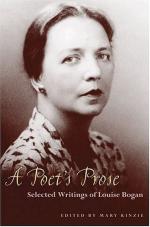|
This section contains 5,869 words (approx. 20 pages at 300 words per page) |

|
SOURCE: "Form, Feeling, and Nature: Aspects of Harmony in the Poetry of Louise Bogan," in Critical Essays on Louise Bogan, edited by Martha Collins, G.K. Hall & Co., 1984, pp. 180-94.
In the following essay, Moldaw examines Bogan's aesthetic principles and style.
Like T. S. Eliot, and unlike William Carlos Williams, in answer to whom she wrote the essay "On the Pleasures of Formal Poetry," Louise Bogan believed that verse is never free. For her, the music and meaning of a poem are indissoluble, and the experience which inspires a poem must be transformed in order to become a work of art:
"unadulterated life" must be transposed, although it need not be "depersonalized." Otherwise you get "self-expression" only; and that is only half of art. The other half is technical, as well as emotional, and the most poignant poems are those in which the technique takes up the burden...
|
This section contains 5,869 words (approx. 20 pages at 300 words per page) |

|


